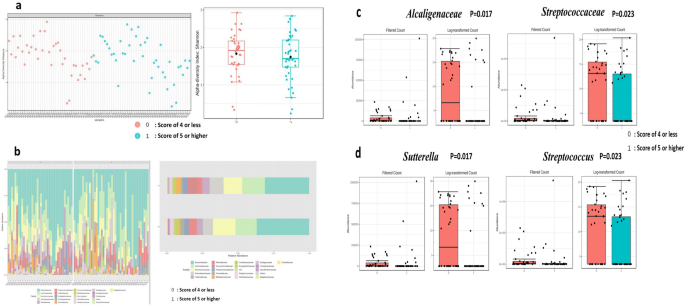💡 This study delves into the understudied connections between stress, quality of life (QOL), and gut microbiota in individuals newly diagnosed with breast cancer.
📌 The study prospectively observes 82 patients, employing the Functional Assessment of Chronic Illness Therapy (FACT)-Breast questionnaire to assess health-related quality of life (HRQOL) and the Distress Thermometer (DT) to gauge distress levels.
📌 The findings emphasize the impact of varying HRQOL, with a significant portion of patients experiencing moderate to severe distress. A striking association between distress levels, HRQOL domains, and gut microbial composition emerges, offering insights into potential biomarker interventions and probiotics for stress alleviation and QOL enhancement in this patient group.
Key Findings:
📌 Varied HRQOL Impact: The study reveals a wide range of health-related quality of life (HRQOL) impact among newly diagnosed breast cancer patients, with a significant proportion experiencing moderate to severe distress.
📌 Notable Sources of Distress: Treatment decisions, nervousness, and worry are identified as prominent sources of distress, emphasizing the need for further assessment and intervention.
📌 Microbiota Associations: The study uncovers significant associations between gut microbiota composition and distress levels, HRQOL domains, and specific microbial taxa.
📌 Microbial Taxa Implications: 𝘈𝘭𝘤𝘢𝘭𝘪𝘨𝘦𝘯𝘢𝘤𝘦𝘢𝘦 𝘢𝘯𝘥 𝘚𝘶𝘵𝘵𝘦𝘳𝘦𝘭𝘭𝘢 are more abundant in patients with higher distress scores. 𝘚𝘵𝘳𝘦𝘱𝘵𝘰𝘤𝘰𝘤𝘤𝘢𝘤𝘦𝘢𝘦 𝘢𝘯𝘥 𝘚𝘵𝘳𝘦𝘱𝘵𝘰𝘤𝘰𝘤𝘤𝘶𝘴 are prevalent in individuals with lower distress scores.
📌 Clinical Implications: The findings underscore the importance of assessing psychological distress, particularly in patients experiencing emotional concerns, to guide appropriate interventions and support.
Patients dealing with treatment decisions as a significant source of anxiety may benefit from tailored support, including education, shared decision-making, and stress-reduction strategies.
📌 Microbiota Implications: The study identifies microbial taxa, such as 𝘈𝘭𝘤𝘢𝘭𝘪𝘨𝘦𝘯𝘢𝘤𝘦𝘢𝘦, 𝘚𝘶𝘵𝘵𝘦𝘳𝘦𝘭𝘭𝘢, 𝘚𝘵𝘳𝘦𝘱𝘵𝘰𝘤𝘰𝘤𝘤𝘢𝘤𝘦𝘢𝘦, 𝘢𝘯𝘥 𝘚𝘵𝘳𝘦𝘱𝘵𝘰𝘤𝘰𝘤𝘤𝘶𝘴 , associated with distress levels and HRQOL domains. These findings raise intriguing questions about the role of gut microbiota in the manifestation of distress and its potential as a therapeutic target.
📍 The findings highlight the prevalence of distress and its varied sources and emphasize the potential roles of specific microbial taxa in distress manifestation. This research opens doors to potential interventions, including biomarkers and probiotics, for alleviating stress and enhancing the quality of life in this patient cohort.
Link to the article : https://www.nature.com/articles/s41598-023-45123-1#Sec17
